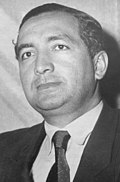This article needs additional citations for verification .(February 2024) |
17 September 1961 | |||||||||||||||||||||||||||||||||||||||||
All 499 seats in the Bundestag [a] 250 seats needed for a majority | |||||||||||||||||||||||||||||||||||||||||
|---|---|---|---|---|---|---|---|---|---|---|---|---|---|---|---|---|---|---|---|---|---|---|---|---|---|---|---|---|---|---|---|---|---|---|---|---|---|---|---|---|---|
| Registered | 37,440,715 ( | ||||||||||||||||||||||||||||||||||||||||
| Turnout | 87.7% ( | ||||||||||||||||||||||||||||||||||||||||
| |||||||||||||||||||||||||||||||||||||||||
 The left side shows constituency winners of the election by their party colours. The right side shows party list winners of the election for the additional members by their party colours. | |||||||||||||||||||||||||||||||||||||||||
| |||||||||||||||||||||||||||||||||||||||||
| This article is part of a series on the |
| Politics of Germany |
|---|
 |
A federal election was held in West Germany on 17 September 1961 to elect the members of the fourth Bundestag. The CDU/CSU remained the largest faction, winning 242 of the 499 seats. However, the loss of its majority and the All-German Party losing all its seats led to the CDU having to negotiate a coalition with the long-term junior coalition partner, the Free Democratic Party, leading to a demand for long-term chancellor Konrad Adenauer to leave office in 1963, halfway through his term.




